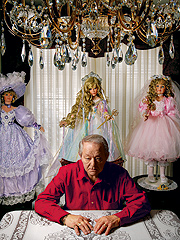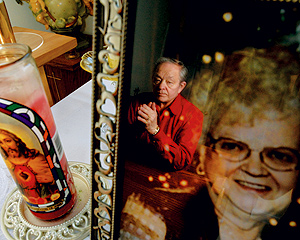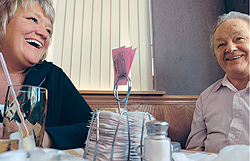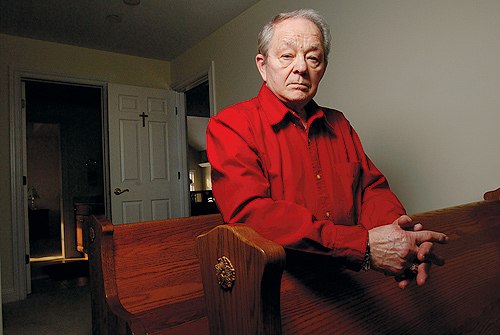In the early evening of September 12, 2000, Alex Snelius, a semiretired truck mechanic, stopped by Burbank Food and Liquor, the neighborhood grocery store where he plunked down $5 four times a week on different lottery games. After buying his ticket, Snelius drove home and turned on the White Sox game—another of his regular habits—but switched to the evening news when it was time for the lottery drawing. The jackpot for that night’s Big Game, the multistate drawing today called Mega Millions, had swelled to $64 million. Snelius jotted down the numbers, but didn’t bother to check them with the ticket; his wife, Ursula, always did that.
Later that night, Ursula returned from playing bingo at their church, St. Albert the Great. “She was mad as a hornet,” recalls Snelius. “For the second week in a row she needed one number more [to win], but they didn’t call her number, and she didn’t get the $500 [prize].” Still in a huff, Ursula asked to see the lotto numbers, and she scanned the Quick Pick ticket for matches. First one matched, and then two. Then three. Four. Five! “When she told me we got the [sixth] big ball,” says Snelius, “I said, ‘Thank you, Lord!’”
On September 18th, the week after he won, lottery officials presented Snelius with an oversize check for $64 million—at the time, the Illinois Lottery’s second-largest payout for a sole ticket holder. Of course, the grand figure printed on the big promotional check isn’t the amount that winds up in the winner’s bank account. Snelius could choose to take the money in one lump sum—roughly half the advertised jackpot—or 26 annual installments. He chose the lump sum. “The rest went to Uncle Sam,” he says, referring to the taxes deducted from his winnings. Ultimately, he ended up with $18.5 million.
Snelius, a Lithuanian immigrant whose 70 years have been mostly hard toil, knew his life would be different after he won. But he didn’t foresee the profound changes brought by the bounce of six numbered balls and 175,711,583-to-1 odds. The improbable windfall meant the end of years of blue-collar struggle—and almost overnight Snelius developed an expensive appetite for big houses, fancy cars, and materialistic excess. Before long, however, he decided that he was less happy than before—that the burdens of newfound wealth overwhelmed the pleasures. As he tells it, his is a cautionary tale for anyone who dreams of getting rich quick.
“When you do win it, you say, ‘Thank you, God’—you know, you’re blessed,” says Snelius. “But you’re not blessed—you’re cursed. Money is not happiness—it’s a curse: People don’t leave you alone; charities come from every direction you can think of; the government taxes the heck out of you. I don’t like it.”
Whether he likes it or not, there is no mistaking Alex Snelius’s post-lottery bonanza on a recent afternoon as he leads me on a tour of his large, red-and-beige-brick house in Westgate Valley Estates, a pricey subdivision of 160 McMansions in south suburban Palos Heights. Actually, Snelius owns four homes in Westgate Valley, and at one point, he owned eight of them, each a “dream home”—two for himself and Ursula, one each for his four children, and one each for his wife’s two sisters. Over the past several years, he has sold off the three homes he bought for his sons, and last August, he sold his 10,000-square-foot, 16-room Georgian-style mansion (the former DePaul basketball star Quentin Richardson, now with the NBA’s New York Knicks, paid $2.2 million for it).
One of Snelius’s remaining Westgate Valley properties, the home belonging to his daughter, Cindy Sanocki, and her husband, Tom, is worth mentioning: lifelong Elvis Presley fans, they built a $1.5-million replica of Graceland, the King’s legendary mansion, complete with the iconic towering white columns and marble lions at the front door (the likeness doesn’t extend to the interior—for example, there’s no repeat of Elvis’s Jungle Room, with leopard print chairs and green shag carpet covering the floor and ceiling). The Sanockis say their home has become an off-the-Memphis-beaten-path tourist destination for Elvis fanatics. “We have a lot of people come by, take pictures—Elvis impersonators, tour buses, you know,” says Cindy.
After selling the mansion, Snelius moved into a smaller (though still big) 4,200-square-foot house down the block. In person, though, Snelius is not remotely a showoff. On this day, he is dressed plainly in a bright red button-down and blue jeans and his demeanor remains unpretentious. He speaks in a heavy eastern European accent—a hint of his Lithuanian roots—flavored by traces of a working-class Chicago dialect. A devout Roman Catholic who attends Mass weekly, Snelius gets more excited showing me his in-house chapel (formerly a spare bedroom) than the $50,000 basement theatre room with a wall-size screen and nine plush stadium seats.
The house is crammed with stuff, mainly religious objects and collectible dolls, arranged museum-style in vitrines on every wall of the dining and living rooms. The feeling is of a cross between the Vatican museum shop and the American Girl store. But to see the really expensive stuff, you have to go to the garage, where Snelius parks his 1956 Ford Sunliner convertible, his 1934 Mercedes kit car, and his top-of-the-line, stretch-version Lincoln Town Car. In a few nearby garages, he keeps more than a dozen other antique cars, including a 1922 Ford Model T, a 1950 Buick convertible, and a 1958 Bentley.
Despite all the fancy trappings, Snelius insists that he prefers to keep life simple. Which brings us to the for-sale sign stuck in the front lawn. After nearly seven years of living the high life, Snelius wants to downsize, a decision he made around the time Ursula died from complications of pneumonia more than two years ago. “I always wanted to see what the other side of the tracks was, and I had it,” he says. “Now, it doesn’t make no difference if I don’t have it.”
Snelius has already begun the process of liquidating his assets. It is an everything-must-go sale: his properties, his cars, and the hundreds of dolls and porcelain figurines that belonged to his wife. (He’s not going to evict any relatives, but even the Elvis house is likely to be sold.) Whatever money is left over, he says, will go to help his family, particularly his grandchildren, and to aid various charities, but he has not worked out the specifics. “What do I need it for?” asks Snelius. “I can’t take it with me.”

Psychologists who have studied the effects of wealth on behavior have found, generally speaking, that money and happiness do not go hand in hand. This is especially true, they say, for people who become overnight millionaires—a phenomenon that the psychotherapist Joan Indursky DiFuria and the psychologist Stephen Goldbart call “sudden-wealth syndrome,” or as others have termed it, “affluenza.”
“As exciting as it is to win a lottery, it causes great discomfort and angst,” says DiFuria, who (with Goldbart) cofounded the Money Meaning & Choices Institute, a San Francisco–based counseling service for people with emotional issues about money. “Money brings envy, jealousy, sometimes disdain.”
Most studies have shown that rich people tend to be happier than poor people. But while becoming superrich eases certain stresses—most obviously, the financial kinds—once a person’s basic security needs are met, there are diminishing returns on the amounts of overall happiness that wealth brings. One recent study, for example, found that happiness was affected less by income than by marital status and health, among other factors. Another oft-cited study even claimed that lottery winners were no happier than paralyzed accident victims—a sign, say researchers, that people usually adapt to whatever comes along, good or bad.
And DiFuria says the effects of life-altering amounts of wealth often bring dread: “There’s a sense of not knowing what to do—‘What do I do with all this money?’ For some, it’s a sense of embarrassment, or guilt. For others, it’s ‘What will other people think of me?’ There’s also a sense of ‘Who do I trust?’”
Indeed, problems arrived almost immediately for Snelius and his family. Sitting around his kitchen table with Cindy and Tom, Snelius talks about the good, the bad, and the ugly of instant, abounding wealth.

First, the good.
The best part about having lots of money is giving it away, says Snelius, and over the years he and his wife donated millions of dollars to charity. Almost immediately after the payout, he recalls, Ursula “was writing checks like it was going out of style.” He adds, “I had to order checks by the thousands because she was giving $25 to everybody—$25 here, $25 there—to army veterans, St. Jude’s [children’s hospital], the Arthritis Foundation, everyone.” They doled out large amounts, as well: $250,000 to Mercy Home for Boys and Girls, plus $25,000 for the home’s televised Sunday Mass that airs on WCIU-TV; $500,000 to the Big Shoulders Fund, the charity founded by the late Joseph Cardinal Bernardin to benefit inner-city Chicago Catholic schools; and $600,000 to help restore a 13th-century Lithuanian church that had been damaged in World War II.
“He is a man of tremendous faith and believes in helping others,” says Joshua Hale, the executive director of the Big Shoulders Fund. “He has certainly helped a lot here at Big Shoulders. He’s one of our bigger donors.”
Since 2001, Snelius has been donating $100 to the White Sox Charities every time a Sox player hits a home run—a total of $137,200 through the end of the 2006 season. (The foundation supports various local nonprofits, mainly cancer research and youth sports.) Ursula, the family’s biggest Sox fan, died in November 2004, before the team’s remarkable 2005 championship season. “She was the angel in the outfield,” he says. “She helped them to win.”
Then there is the bad: for starters, the unwanted fame and attention that go along with winning the lottery. Snelius says that, once the world learned of his new wealth, he became a target. Almost immediately, letters with strangers’ sob stories started arriving by the hundreds, possibly thousands. Relatives whom Snelius had never met came out of the woodwork. Friends and business associates hounded him for handouts. “I lost a lot of good friends,” he says. “Friendship is no money involved. But it seems like that’s all it became. It turned me off.” One of his closest—now former—friends expected yearly cash gifts. Cindy chimes in: “He was like, ‘Put me on your payroll.’”
Snelius acknowledges that at first he had a hard time saying no. He bailed out the struggling businesses of several friends, loaned thousands upon thousands of dollars to relatives, and, on rare occasions, even sent money to hard-luck strangers who had written him. Most people, he notes, just took advantage of him. “I got so many people I give money that claim they’re going to pay me back. I got a better chance of winning another lotto than getting paid back.”
Also part of the bad: the jackpot led the family to abandon its roots, to mixed results. Newly millionaires, the Snelius clan moved from Burbank, where they had lived for 40 years, to Palos Heights, a place where they imagined rich people are supposed to live. But Snelius says they got treated by their well-off neighbors as if they were the Clampetts of the TV sitcom The Beverly Hillbillies—a blue-collar family that moved into a blue-blood neighborhood. Tom Sanocki, his son-in-law, says that the community regarded them merely as “the Lottery Winners,” even though many of the neighbors, like the Sneliuses, are nouveaux riches. “[Alex Snelius] worked his ass off—harder than anybody in this subdivision—I guarantee it,” says Tom.
And the ugly?
Being rich, says Snelius, tore apart his family. He rarely talks to his three sons, James, 48, Robert, 43, and Daniel, 39, and Snelius is not even sure of their whereabouts since kicking them out of the Westgate Valley homes he had bought for them. He is reluctant to talk in much detail about his sons’ personal troubles, saying only that they have had on-again, off-again drug problems, which preceded his lottery success but worsened afterwards. (Court records confirm that Snelius’s sons have lengthy criminal records—dating from both before and after their father’s lottery win—that include convictions for such things as possessing illegal drugs and drug paraphernalia, fraud, theft, and domestic battery. Efforts to reach the sons for comment were not successful.)
At first Snelius thought money could solve his sons’ personal problems. He bought each of them new, fully furnished half-million-dollar homes down the street from his, and he also gave them large sums—a total of about $1.5 million, he estimates—to start their own businesses. But there were strings attached. “I asked my sons to do three things: number one, go to church on Sundays—God is number one; number two, you get a job, go to work; number three, stop taking drugs.” But, he continues, “none of it happened.”
Snelius says his sons treated him like an ATM. And the businesses that he bankrolled—a sports memorabilia shop, a toy-car store, and a tree stump and snow removal company, among other things—all failed. “All these businesses—they became nightmares,” he says. “In my opinion, I just wasted money. None of my sons succeeded. I had a business for 22 years; my sons’ lasted three months, six months—then, boom! Gone. They thought easy come, easy go. All I did all my life is work—12, 14, 16 hours a day, seven days a week.”
To underscore his ferocious work ethic, Snelius shows me his left ring finger, partially severed and shorter than his other fingers. Years ago, Snelius says, he was looking under the hood of a truck, repairing the engine, when the hood fell and slammed onto his finger. Instead of rushing to a hospital emergency room, he wrapped the digit with an oily rag and finished the job. “The customer needed the car,” he says. “I can’t disappoint him because I knocked my finger off—no way.”

Born in 1936 in Klaipeda, Lithuania, a port city on the Baltic Sea, Snelius fled with his family about 50 miles south in 1944 to Kaunas, Lithuania’s second-largest city, as Soviet and German forces fought for control of the war-torn country. “You could hear the bombs, the fighting, so we kept running,” recalls Snelius, who, along with his twin brother, Frank, was the third oldest of eight children. “We ran to save our lives.” When Russian troops closed in on Kaunas, the family took flight once again, this time by way of a treacherous boat journey up the Nemunas River, hiding in the thick brush along the riverbank whenever bombers would fly overhead. Eventually, they made it to Germany’s northernmost state of Schleswig-Holstein, in the waning days of the war, when the German army was in retreat. “I seen so many people die,” he says, “it’s embedded in my head till the day I die.” One memory, though, is especially haunting: the death of his younger brother, Gedaminas, then six, who was accidentally run over by a truck from a British convoy in 1945.
After the war ended, Snelius’s family immigrated to the United States, part of the wave of displaced Europeans who were sponsored by American farmers or industrialists seeking cheap labor. Snelius’s father worked on cattle and cotton farms in Sherman, Texas, and nearby Denison, until he could pay off the family’s $500 train fare from New York City to Texas. “My father worked for a quarter an hour,” says Snelius. “He would just make enough wages to pay for food.” The whole family chipped in on the farm and worked as landscapers on weekends.

Eventually, they scraped enough money together to repay the family’s debt and move to Chicago. Snelius’s father worked as a truck mechanic and the boys got jobs at a bowling alley and helped out at the repair shop where the father worked. “When I was a kid, he made me do things for him—take an engine apart, do this, or do that,” recalls Snelius. “So I learned from hard knocks; never went to school or nothing.”
In 1951, when he was 15, Snelius spotted a pretty young girl at the corner chatting with her girlfriends: Ursula Laurenkus. It was love at first sight, he recalls, but he waited two years to gather up the nerve to ask her out—and four more to propose marriage. Bertha Ciciora, Ursula’s older sister, recalls how she finally persuaded Snelius to pop the question: “I told him, ‘If you buy a ring and put it in a box of chocolate, she’ll take it.’ And that’s what he did.”

They were married for 47 years. “She got sick on a Monday and died on Friday,” he recalls. “It was like a downfall.” He visits her grave every morning. “You can have a billion dollars. If you don’t have true love, it don’t mean nothing.” In some ways, Snelius has tried to fill the void left by Ursula’s death by giving his fortune away. “My wife taught me a lesson when she died,” he says. “What did she take with her? Whatever I put in the casket. A dress, that’s it. We don’t need to possess fortunes, ’cause you can’t take nothing with you.”
People who know Snelius are not surprised by his generosity. “Even if he had nothing to give away, he’d give away,” says the Rev. Scott Donahue, president and CEO of Mercy Home for Boys and Girls. Donahue recalls talking casually with Snelius once about needing new vestments for Mercy’s televised masses. “The next thing I know,” says Donahue, “he’s buying us new vestments.” The same view was echoed by Christine O’Reilly, the Sox’ senior director of community relations, who says Snelius has become a close friend to the team. “Really, everyone in the front office—they don’t think of Alex as ‘Alex the Great Contributor’; they think about ‘Alex, that sweet guy,’” she says. “He’s just this simple, loving, generous man. That’s how he lives his life: simply, lovingly, generously.”
Snelius cannot comprehend any other way to live. “Nobody needs billions; nobody needs millions,” he says. “I could’ve went to Mexico, bought a big hacienda on the beach, had a maid, and lived like a king the rest of my life.” Instead, he says, simply: “I intend to give as much as I can until I die.”
That may be so, but it is unclear how much of Snelius’s fortune actually remains. Much of his net worth, roughly $10 million, is tied up in real estate and uncollected IOUs, and for the first time in several years, Snelius says he is cash strapped. Liquidating his assets takes time. He has had to scale back on his charitable donations. “If I sell this house, if I sell my other houses, I’ll write checks out,” he says. (Don’t fret, Sox fans: Snelius says he will continue his $100 home-run contributions.)
In the meantime, Snelius has already bought his next home—a “smaller house,” he is quick to point out—in nearby Frankfort. But he might put that one up for sale, too. The only property he insists is not for sale is the $100,000 worth of cemetery plots and family monuments he has at St. Casimir Lithuanian Cemetery on Chicago’s Far Southwest Side. “I already paid for my funeral,” he says. “I’m all set to go.”




Comments are closed.